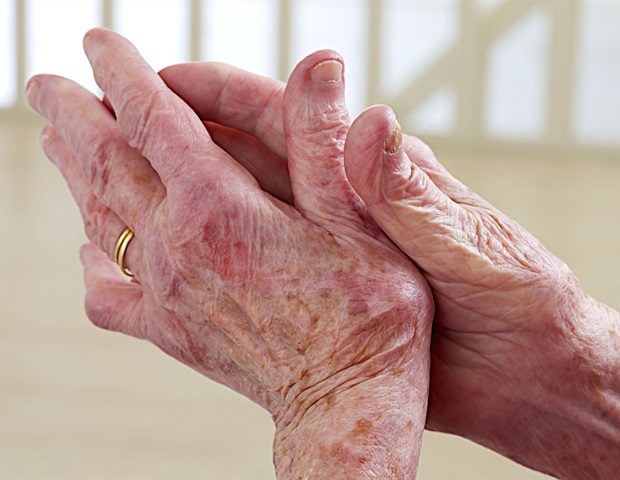Early results of an international study examining the risk of arthritis for people with psoriasis have shown a high burden of joint symptoms in 712 patients – 25% of the total studied so far.
The study led by researchers at the Universities of Oxford, University College Dublin and supported by The University of Manchester has recruited almost 3,000 patients so far.
But the team are still on the hunt for 2,000 more patients with psoriasis, a condition that causes flaky patches of skin covered with white scales which affects about 3% of people in the UK and Europe.
The 25% figure results confirms existing knowledge that up to a third will go on to develop psoriatic arthritis (PsA), which causes joints and tendons to become inflamed and painful.
Professor Laura Cotes, Associate Professor at the University of Oxford, is leading the project.
She said: “At the moment there is no way to predict which patients with psoriasis are likely to go on to develop joint problems.
“This research will help us to design ways to prevent people with psoriasis developing arthritis, by offering potential drug treatments or lifestyle interventions such as exercise or stress management.”
Called the HIPPOCRATES Prospective Observational Study (HPOS), the online study monitors people with psoriasis over a three-year period to see who develops PsA.
Participants fill in questionnaires online and send small fingerprick blood samples by prepaid post.
After launching in the UK in July 2023 the study opened for recruitment in Ireland in August 2023 followed by Greece in February 2024 and Portugal in April 2024.
The study team in Oxford are working to open HPOS in a further 12 European countries with the ultimate goal to recruit 25,000 people with psoriasis.
This week on 19 and 20 June, researchers from across Europe will be meeting in Manchester to discuss the progress in the study so far.
To date, we have baseline data on a total of 2,841 patients, of which 1761 are from Ireland and 1067 are from the UK.”
Professor Laura Cotes, Associate Professor, University of Oxford
Professor Ann Barton from The University of Manchester will be leading on analysis of genetic samples collected in the study.
She said: “We know that some patients with psoriasis will go on to develop psoriatic arthritis. If we could identify which patients are at higher risk for arthritis development, it could mean that in the future, those people could receive preventative treatment.
“Manchester is leading the work to identify genetic changes that could be used to predict which patients with psoriasis might be at increased risk of developing psoriatic arthritis. The HPOS study will allow us to collect samples from patients with psoriasis to help drive forward this work.”
Russ Cowper, who lives in Manchester and has lived with PsA for many years said: “Psoriatic Arthritis is so hard to diagnose it can lead to real confusion for patients, they know something is not right but cannot explain it.
“GPs are not always skilled enough to spot the symptoms and they may manifest themselves in a myriad of different ways. Receiving a diagnosis is in many ways a relief, patients can then plan for the future knowing that they do indeed have an ongoing condition
“PsA can be debilitating, with me it is also quite random. I can be quite well for days and then all of a sudden I cannot get out of bed and I’m wracked with painful joints.
“The only joints that have not been affected are my elbows, everywhere else I have suffered flares, even in my jaw.
“It is a miserable condition and it is very tiring, pain can cause lack of sleep and if hands are affected then it’s a struggle to do day to day tasks. If really bad applying creams to treat the skin becomes difficult and you risk a psoriasis flare.”
Source:











